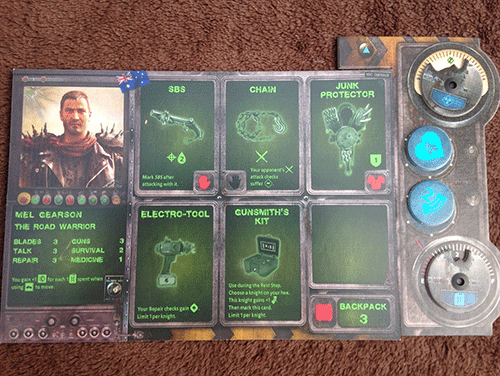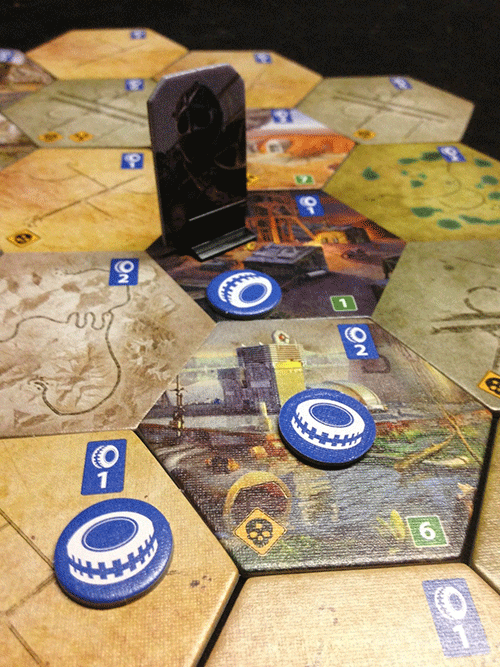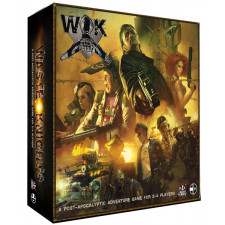Waste Knights Review
on Jul 13, 2016
Polish games inspired by rough-and-tumble American-style designs are the new black, and Waste Knights is another great example of this trend. Following up their title 7 Ronin (soon to be domestically released), Badger’s Nest has hit us with a fresh dose of post-apocalyptic mayhem like a sledge to the jaw. Waste Knights is covered in rust, blood, and oil and you can’t wait to roll around in the muck.
This is a brutal yet colorful post-apocalyptic vision that’s two parts Max Rockatansky one part Fallout. The two are shaken together and splashed across a tabletop jammed packed with hexes, tokens, and cards. The production is visually sincere and pleasant as hell on the eyes. Everything from the small sized item cards to the hex illustrations and the character’s portraits align with this razor edge vision of the world gone sideways, yet it manages to stay relatively bright and energetic. It’s much more George Miller than Cormac McCarthy.
Waste Knights comes across as something which could have been produced by the mighty Fantasy Flight Games. The cardboard is thick and well loved, the attention to detail is exceptional, and everything just functions superbly. The only blemishes on this peach come in the form of the occasional translation issue. You will notice spread throughout the flavor text an occasional flub or awkward sentence structure but it’s nothing terrible and easy to overlook.
Additionally the rulebook is rather large and can be a beast to tackle. The weight is somewhere in the Arkham/Eldritch Horror realm in both rules complication and component saturation. Apply some patience and care and you’ll be putting the rubber to the pock-filled road in no time.
The structure of play is straightforward in that you travel across the wasteland, experience encounters, and take advantage of location benefits. You’re generally trying to fulfill tasks for the short term while keeping the overarching scenario objective in your peripheral vision. What makes Waste Knights infectious like a bout of the rad plague is the small inflections of subsystems comprising each of the major elements. In this way it reminds me a bit of Christophe Boelinger and I see a couple of nods in the same direction as Earth Reborn.
The first subsystem to take note of is readily apparent when you get your player-mat. You have inventory slots as weapons take up hands, chest, or pocket positions with a power relative to a tiered item structure. Characters are differentiated by several stats, a special ability, and starting equipment printed directly onto the sheet. You can cover this starting equipment up as you tear a Flamethrower from a dead mutant’s body or fuse a cybernetic implant into your skin. There’s a constant sense of opening a new toy via gear earned and bought.

The equipment fuels the top-notch combat system. Here players each receive an identical deck full of action cards including options of Attack, Defend, Advance/Retreat, and Prepare. You can inflict pain with your weaponry or turtle up to keep your fragile life in the balance. All tests in this game are dice pools against set target numbers, in combat that target number is determined by range.
Combat range is abstracted and factors into the target number as well as weapon initiative. At close range you can only use short distance and melee options as you’d expect, while rifles excel at long. Interestingly enough you can also opt to hunker down and hang on to the end and win via momentum – much like Forbidden Star’s morale system.
There’s a very satisfying sense of narrative paired with just the right amount of abstraction. As you play an Advance card to charge at your opponent so you can use your sawed-off, you get a real sense of colorful drama while he’s throwing slugs your way with his assault rifle. The momentum reinforces the percussive weight of your decisions in a compact and elegant manner.
Likewise, hauling across monster infested country is handled with flair. You travel by spending fuel to move with one of several vehicle options and plot your path across the map. One of the opposing players takes the role of the Wastelander and draws hazard cards that are comprised of mostly wicked events and perilous foes. They will choose one card to play during your movement, interrupting the action to force a check or an encounter.

The further you move on your turn the more cards they draw and options they have. Additionally certain hexes may allow the Wastelander to draw more cards, suggesting you take care in plotting your trip. This palpable sense of danger infuses the push your luck element of stretching your vehicle to the limit and risking a jaunt through broken ground.
You can run through rubble and damage your car, come across vast clouds of locusts, and be assaulted by human/centipede centaurs out to gut you. This player enforced advocacy for the harsh reality of the environment works superbly as opposed to a simple AI system. The decisions are more nuanced and more importantly, vindictive.
The idea is strategically running from point to point across the board to accomplish diverse tasks such as muling equipment or bagging mutant lizard pelts to decorate a surly fella’s bar. This is relatively standard adventure game stuff, enhanced by strong flavor and that fantastic encounter system.
The greater context is provided via the scenario filled Mission Book. You can compete to simply have the highest fame or seek to find the malicious Bloody Mary and bring her back to the big boss to be reckoned with. The culminating scenario, Cult of the Manifold, has you hopping to infested cities and clearing the bile for the greater good; imaginative and always interesting.
Like the upper echelon of Ameritrash adventure games, Waste Knights is not defined entirely by its mechanisms or lengthy playtime. Long after the game ends you’ll be sharing a beer and reminiscing on affixing a flamethrower with a bayonet to take down that massive AI tank roaming the dead lands. If that doesn’t perk up your interest, then you don’t have a pulse.

 Customer Support
Customer Support  Subscribe
Subscribe 




 Account
Account  Wishlist
Wishlist 

